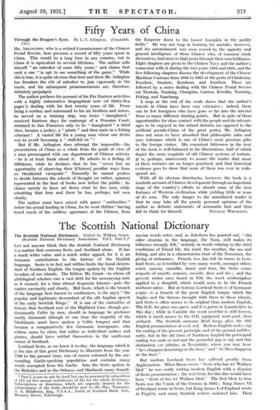Fifty Years of China
MR. ARLINGTON, who is a retired Commissioner of the Chinese Postal Service, here presents a record of fifty years spent in China. This would be a long time in any country, but in China it is equivalent to several lifetimes. The author calls himself "an onlooker of some fifty years," and claims that such a one "is apt to see something of the game." While this is true, it is quite obvious that here and there Mr. Arlington has forsaken the role of onlooker to join vigorously in the tussle, and his subsequent pronouncements are, therefore, definitely prejudged.
The author prefaces his account of his Far Eastern activities with a highly informative biographical note (of thirty-five pages !) dealing with his first twenty years of life. From being a cowboy and nursemaid to his six brothers and sisters, he served on a training ship, was twice "shanghaied," received fourteen days for contempt of a Prussian Court, returned to San Francisco only to be " shanghaied " a third time, became a jockey, a " pirate " and then mate in a fishing schooner ! A varied life for a young man whose one desire was to avoid becoming a "stall-fed ox " !
But if Mr. Arlington does attempt the impossible—the presentation of China as a whole from the point of view of a man preoccupied with one department of Chinese activity —he is at least frank about it. He admits to a feeling of diffidence, while he declares that he has "never lost an opportunity of observing their [Chinese] peculiar ways from an Occidental viewpoint." Naturally he cannot profess to decide between the schools of thought (or rather, opinion) represented in the host of books now before the public ; he claims merely to have set down what he has seen, while admitting that here and there he has, perhaps, not seen clearly.
The author must have mixed with queer " authorities " before his actual landing in China, for he went thither "having heard much of the sublimo ignorance of the Chinese, from
the Emperor down to the lowest bumpkin in the paddy fields." He was not long in learning his mistake, however, and his astonishment was soon roused by the sagacity and general intelligence of those Chinese who, of common stock themselves, had risen to high posts through their own brilliance. Eight chapters are given to the Chinese Navy and the author's connexion with it during the two years 1884 and 1885, and the five following chapters discuss the development of the Chinese Maritime Customs from 1886 to 1905 at the ports of Chinkiang, Foochow, Swatow, Kowloon, and Soochow. These are followed by a series dealing with the Chinese Postal Service (at- Tientsin, Nanking, Changsha, Canton, Kweilin, • Nanning, Peking, and Nanchang.
A map at the end of the work shows that the author's travels in China have been very extensive ; indeed, there can be few foreigners who have gone so far into the interior from so many different starting points. But in spite of. these. opportunities for close contact with the people and the advant- ages to be enjoyed in the inland districts (as opposed to the artificial pseudo-China of the great ports), Mr. Arlington does not seem to have absorbed that philosophic calm and easy tolerance which is one of China's most precious gifts to the foreign visitor. His consistent bitterness in the text of the book is well-balanced in his illustrations, half of which depict the more exquisite of old Chinese systems of torture. It is, perhaps, unnecessary to assure the reader that most of these tortures are no longer practised, and that historical evidence goes to show that none of them was ever in wide- spread use.
With all its obvious drawbacks, however, the book is a readable account of Chinese development through an important stage of the country's efforts to absorb some of the best features of Western civilization while yielding little or none of its own. The only danger to the uninitiated reader is that he may take all the purely personal opinions of the author as definite statements of axiomatic fact and thus


























 Previous page
Previous page